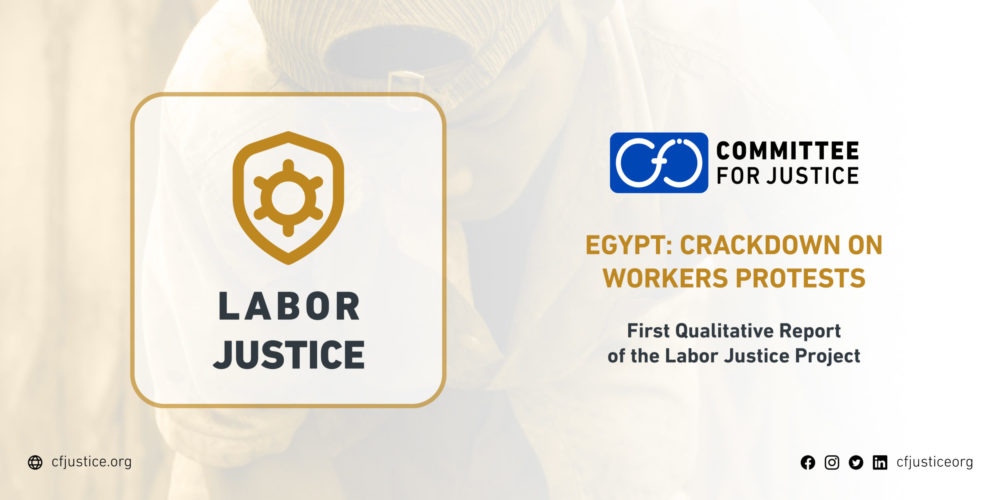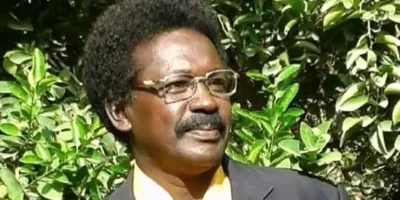The Committee for Justice has issued its first qualitative report as part of the Labor Justice project, titled “Security Intervention in Labor Protests”. The report attempts to answer the question of whose side Egyptian law is on in this conflict, presenting the most prominent incidents of security intervention through pursuit, detention, and intimidation against workers since the beginning of 2023 until February 2024.
The report reviews Egypt’s international and constitutional commitments towards workers and protecting their rights in organizing, expressing themselves, and defending their interests, and the contradiction of local legislation with these commitments in terms of labor law and civil service laws, which restrict the ability of workers and employees in the public and private sectors to negotiate and press for their interests, such as Articles 192 and 194 of the current Egyptian labor law and Prime Minister’s Decision No. 1185 of 2003, which was issued in implementation of Article 194 of the labor law, regarding the identification of strategic or vital facilities where the right to strike is completely restricted.
The report also highlights the most important incidents of security intervention against labor protests from the beginning of 2023 until February 2024, including the purely security handling of the crisis of Ghazl El-Mahalla company workers and their strike until the implementation of the minimum wage decision on them, where several workers were arrested at the National Security headquarters in Gharbia, and one of them was referred to the Supreme State Security Prosecution.
Similarly, the report sheds light on what happened during the crisis of the 30,000 teachers’ competition, where 14,000 of them were excluded for unknown or frivolous reasons, and when they protested against this exclusion, 14 were arrested in front of the Ministry of Education headquarters in the Administrative Capital and were accused by the Supreme State Security Prosecution of joining a terrorist group, spreading false news, misusing social media, and participating in a gathering.
Additionally, 9 workers from the Kiriazi Electrical Appliances Company in El-Obour were arrested from their homes based on reports filed against them by the company. The workers were detained at the El-Obour police station, and the prosecution ordered their detention for 15 days on charges of demonstrating without permission and calling for a strike, in response to a protest organized by workers in February 2023 demanding better wages, in addition to the whirlpool of pretrial detention that targeted many activists in the labor field, including Mohamed Hashem Farghali, an employee of the Public Authority for Public Transport, and Samah Zakaria, an Egyptian ambulance worker.
In conclusion, the Committee for Justice recommends the immediate release of workers detained due to the strike of the Egypt Spinning and Weaving Company in Mahalla El-Kubra, and to stop unjustified escalation against them and not to punish them for their peaceful and legitimate demands, and to release the protesters in front of the Ministry of Education headquarters and enable them to appeal against their arbitrary exclusion decision, and to stop the security pursuit of labor leaders, activists, and defenders of their labor rights, and to refrain from imprisoning them pretrial and conducting unfair trials.
CFJ also calls for involving workers and their representatives in the discussion of draft legislation, stopping the dialogue limited to employers and investors, and reviewing unfair legislation that does not comply with the Egyptian constitution and Egypt’s international
obligations, such as the civil service law, labor law, as well as laws on demonstration, assembly, and terrorism, which enable the authorities to crackdown on workers and other citizens.
CFJ also urges the Egyptian authorities to retract Decision No. 2297/2020 amending some provisions of the Education Law, which stipulated arbitrary conditions for the appointment of teachers, including passing physical, sports, and personal tests at the Military College, and to cancel the illogical control of the Military Academy over the appointments of civilians in government departments and agencies.






